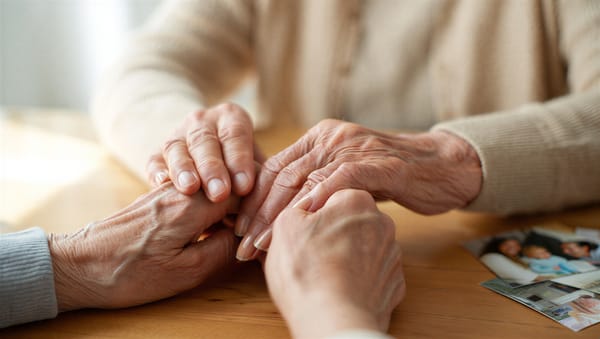The Physical Side of Grief: Why Your Body Hurts When Your Heart Does
Grief causes real physical symptoms: chest pain, fatigue, digestive issues, immune suppression. Learn why your body hurts when your heart does & when to seek help.

You wake up with a pounding headache. Your chest feels heavy, like someone placed a weight on your sternum overnight. Your muscles ache as if you've run a marathon, though you barely moved yesterday. You reach for your phone to check the time, and even that simple motion feels exhausting.
If you've recently lost someone you love, these sensations aren't random. Your body is responding to grief, and that response is as physical as it is emotional. When people talk about grief, they often focus on the emotional devastation—the sadness, the anger, the disbelief. But grief doesn't live only in your heart or your mind. It moves through your entire body, manifesting in ways that can feel confusing, frightening, or even unrelated to your loss.
This isn't weakness. This isn't your imagination. This is your body responding to one of the most profound stressors a human being can experience. Understanding why your body hurts when your heart does can help you navigate this overwhelming time with more compassion for yourself and clearer knowledge about when to seek additional support.
Key Takeaways
- Grief triggers a profound stress response in your body, releasing cortisol and other hormones that can cause physical symptoms ranging from headaches and muscle pain to digestive issues and immune suppression
- Physical grief symptoms are completely normal and typically include fatigue, sleep disturbances, changes in appetite, chest tightness, body aches, and weakened immunity
- Understanding the connection between your emotional pain and physical symptoms can help you recognize when you need medical attention versus when symptoms are a natural part of grieving
- Managing physical grief requires foundational self-care: adequate rest, gentle movement, nutritious food, hydration, and emotional support, though expectations should be adjusted for what self-care looks like during grief
- Having something tangible to hold during intense grief can provide comfort and help ground you when physical symptoms feel overwhelming
Reflections on love, loss, and the ways we carry them.
When someone you love dies, your body feels it as deeply as your heart does. Grief isn’t just emotional, it’s biological. Your brain interprets loss as a threat to survival. It releases stress hormones like cortisol and adrenaline, keeping your body in a constant state of alertness. This is why, in the early months, you may feel exhausted but unable to rest, hungry yet unable to eat, or tense even while doing nothing. Your body is fighting to adapt to a world that no longer feels safe.
I once worked with Liza, a young widow who came to me six weeks after her husband’s sudden death. “I feel like I’m always bracing for bad news,” she said. Her heart raced at random, her appetite vanished, and she hadn’t slept more than three hours a night since the funeral. Together, we began by focusing not on “moving on,” but on slowing down. We built tiny rituals of care: morning stretches by her window, short evening walks, a small notebook where she wrote one sentence a day about something her husband had loved. Gradually, her body began to soften. Her breath deepened, her shoulders eased, and sleep slowly returned.
Grief lives in the body, and healing begins there too. It asks for gentleness. Nourishment, rest, sunlight, and kindness toward yourself. You may not feel strong, but your body is quietly working to protect you, to help you survive what feels unsurvivable.
So if you find yourself weary or foggy in grief’s early months, remember this: you are not failing. You are healing in slow motion. Give your body time, and it will carry you toward steadier ground.
Cathy Sanchez Babao
Parting Stone Grief Coach
Why Grief Affects Your Physical Body
Grief activates your body's stress response system with extraordinary intensity. When you experience a significant loss, your brain interprets this as a threat to your survival—and in many ways, it is. The death of someone you love disrupts your sense of safety, your daily routines, your identity, and your understanding of how the world works.
Your hypothalamic-pituitary-adrenal (HPA) axis—the system responsible for managing stress—kicks into high gear (Segerstrom & Miller, 2004). This triggers a cascade of physiological changes designed to help you cope with immediate danger. Your adrenal glands release cortisol, often called the "stress hormone," along with other chemicals like adrenaline and norepinephrine.
In short bursts, this stress response can be helpful. It gives you energy to handle funeral arrangements, make difficult decisions, and get through those first impossible days. But grief doesn't resolve in a few days or even a few weeks. When your stress response system remains activated for weeks or months, cortisol continues flooding your bloodstream. Over time, chronic cortisol elevation begins to affect nearly every system in your body (Irwin & Miller, 2007).
The Stress-Inflammation Connection
Research has shown that bereaved individuals experience elevated cortisol levels for up to six months after a loss, and sometimes much longer (O'Connor et al., 2013). While cortisol initially helps limit inflammation, chronic exposure creates what scientists call "glucocorticoid resistance"—your immune cells become less sensitive to cortisol's anti-inflammatory signals (Rohleder, 2019). When this happens, inflammation increases throughout your body, contributing to pain, fatigue, and susceptibility to illness.
Additionally, your nervous system stays in a state of hyperarousal. Your sympathetic nervous system—responsible for the "fight or flight" response—remains activated, keeping your heart rate elevated, your muscles tense, and your digestion disrupted (Fagundes et al., 2019). This constant state of physiological vigilance is exhausting, which explains why even simple tasks can feel insurmountable when you're grieving.

Common Physical Symptoms of Grief
Grief can manifest differently in each person, but certain physical symptoms appear consistently across different types of loss. Understanding what's common can help you recognize your body's grief response and distinguish between normal grief symptoms and those requiring medical attention.
Cardiovascular and Chest Symptoms
Many grieving people describe a sensation of heaviness or tightness in their chest, sometimes accompanied by heart palpitations or rapid heartbeat. This isn't just metaphorical "heartache"—it's a real physical phenomenon (Cleveland Clinic, 2023).
- Chest pain and tightness: The emotional distress of grief can cause physical tension in your chest muscles and increase blood pressure. Some people experience what feels like difficulty taking a deep breath, as though their lungs can't fully expand (Josell, 2023).
- Elevated heart rate: Your activated stress response keeps your heart beating faster than normal, even when you're resting. This can feel like your heart is racing or pounding (WebMD, 2024).
- Blood pressure changes: Research has documented that bereaved individuals, particularly those who've lost a spouse, may experience sustained increases in blood pressure that can persist for years (Fagundes & Way, 2014).
In rare cases, intense emotional stress from grief can trigger a condition called Takotsubo cardiomyopathy, sometimes known as "broken heart syndrome," which mimics symptoms of a heart attack (Vaccarino et al., 2018). While this is uncommon, it underscores how profoundly grief affects your cardiovascular system.
Meet Justin Crowe, founder of Parting Stone. After his grandfather passed away in 2014, Justin noticed something many families experience: the discomfort of living with cremated remains stored in closets, garages, or basements. That personal loss inspired him to create something different. Working with material scientists at Los Alamos National Laboratory, Justin developed a way to transform 100% of cremated remains into smooth, touchable stones that families can hold, share, and carry with them. Today, Parting Stone has served over 13,000 families who were ready for an alternative to traditional ashes.
Gastrointestinal Disturbances
Your gut is sometimes called your "second brain" because of the extensive network of nerves lining your digestive tract. The gut-brain connection means that emotional distress directly impacts digestion (Mayer, 2011).
- Changes in appetite: Some people lose their appetite completely, finding that food holds no appeal or that eating feels like an impossible task. Others experience increased appetite or find themselves eating compulsively, seeking comfort in food (Cleveland Clinic, 2023).
- Nausea and stomach pain: Stress hormones can trigger nausea, create stomach cramping, or cause that hollow, aching feeling in your abdomen (Josell, 2023).
- Digestive issues: Diarrhea, constipation, or irritable bowel symptoms are common. Your digestive system slows down or speeds up in response to stress signals from your nervous system (WebMD, 2024).
Many grieving people describe feeling like they "can't stomach" their loss—and this sensation has a literal physiological basis.
Musculoskeletal Pain
Physical pain is one of the most common yet least discussed symptoms of grief. The connection between emotional pain and physical pain is well-documented in medical literature (Eisenberger, 2012).
- Muscle tension and aches: Your muscles remain in a state of tension when your stress response system is activated. This can manifest as general body aches, stiffness, or pain that moves around your body (WebMD, 2024).
- Headaches: Tension headaches from muscle tightness in your neck and shoulders are extremely common during grief. Some people also experience migraines (Josell, 2023).
- Joint pain: Inflammation triggered by chronic stress can cause or worsen joint pain, particularly in people who already have conditions like arthritis (Cleveland Clinic, 2023).
- Back and neck pain: Poor sleep, tensed posture, and muscle guarding all contribute to back and neck discomfort that can become chronic if not addressed.
Immune System Suppression
Grief significantly impacts your immune system's ability to function properly. This makes you more vulnerable to illness at precisely the time when you most need your strength (Segerstrom & Miller, 2004).
- Increased susceptibility to infections: Bereaved individuals show decreased lymphocyte function and reduced natural killer cell activity—the cells responsible for fighting viruses and other pathogens (Irwin et al., 1987). You may find yourself catching every cold that goes around or experiencing infections that linger longer than usual.
- Reactivation of latent viruses: The weakened immune response can allow dormant viruses like Epstein-Barr virus or herpes simplex (cold sores) to reactivate (Glaser & Kiecolt-Glaser, 2005).
- Slower wound healing: Research has shown that stress affects how quickly wounds heal, meaning that any injuries or surgical incisions may take longer to recover during periods of intense grief (Broadbent et al., 2003).
Neurological and Cognitive Symptoms
The cognitive effects of grief can feel as disabling as physical pain. Many people describe feeling like they're moving through fog or water.
- Difficulty concentrating: Your brain's executive function—the system responsible for planning, organizing, and focusing—becomes impaired during grief (Hall et al., 2014).
- Memory problems: You may forget appointments, lose track of conversations, or struggle to remember details that would normally come easily. This isn't early-onset dementia; it's your overwhelmed brain trying to process trauma (Josell, 2023).
- Brain fog: The sensation of mental cloudiness or confusion is extremely common and is related to both the neurological effects of stress hormones and the exhaustion from poor sleep (Cleveland Clinic, 2023).
- Dizziness or lightheadedness: Changes in breathing patterns, blood pressure fluctuations, and stress can all contribute to feeling unsteady or dizzy (WebMD, 2024).
Sleep Disturbances
Sleep problems are nearly universal in grief, yet adequate rest is crucial for both physical and emotional recovery.
- Insomnia: Difficulty falling asleep is common, as your mind races with thoughts about your loss, regrets, or worries about the future (Mayo Clinic, 2023).
- Frequent waking: Many grieving people wake repeatedly during the night and struggle to fall back asleep. Your nervous system's hyperarousal keeps pulling you out of deep sleep stages.
- Nightmares: Vivid, distressing dreams about your loved one or the circumstances of their death can disrupt sleep and leave you feeling emotionally raw upon waking (Mayo Clinic, 2023).
- Sleeping too much: Some people experience hypersomnia—sleeping excessively—as their body and mind try to escape the pain or simply recover from exhaustion (Cleveland Clinic, 2023).
Profound Fatigue
Perhaps the most overwhelming physical symptom of grief is exhaustion that doesn't improve with rest.
- Emotional exhaustion: Processing loss is incredibly demanding work. Even when you're not consciously thinking about your grief, your brain and body are working constantly to integrate this new reality (Josell, 2023).
- Physical depletion: The combination of poor sleep, elevated stress hormones, immune system activation, and emotional strain creates a level of fatigue that can feel debilitating. Simple tasks like showering, preparing a meal, or answering emails can feel impossibly difficult.
Lynn from Houston, Texas 🖤 describes how the physical aspects of grief surprised her: "I have been able to quietly and privately place stones in places that were meaningful to us through our 53 years together, share them with family and the closest of friends, and keep a few close to favorite photographs. They are a beautiful and comforting presence. The beauty and life of the stones and the tactile comfort of holding a stone" helped her manage the overwhelming physical sensations she experienced after her husband's death.

Understanding the Timeline: Acute Grief vs. Prolonged Symptoms
It's important to understand that physical symptoms of grief change over time. In the immediate aftermath of loss—the first days and weeks—your symptoms may be most intense. This is acute grief, and the physical manifestations can be severe.
For most people, the intensity of physical symptoms gradually decreases over the first few months as your stress response system begins to recalibrate. However, grief doesn't follow a predictable timeline, and physical symptoms may come in waves, sometimes triggered by anniversaries, holidays, or unexpected reminders of your loss.
Research suggests that for most bereaved individuals, physical symptoms begin to stabilize around the six-month mark, though this varies widely (Mayo Clinic, 2022). Some people experience improvement more quickly; others find that physical symptoms persist much longer, particularly if they're dealing with complicated grief or if they had a close, dependent relationship with the person who died.
When Physical Symptoms Indicate Complicated Grief
While most grief-related physical symptoms are normal and will improve over time, some situations warrant professional evaluation. Complicated grief (also called prolonged grief disorder) affects approximately 7-10% of bereaved individuals and is characterized by grief symptoms that don't improve more than a year after the loss (Shear et al., 2011).
Physical indicators that may suggest complicated grief include:
- Physical symptoms that worsen rather than gradually improve after several months
- Complete inability to function in daily life due to physical exhaustion or pain
- Severe, persistent insomnia despite good sleep hygiene practices
- Significant unintentional weight loss or gain (more than 10% of body weight)
- New onset or worsening of chronic health conditions directly linked to stress
If your physical symptoms feel unmanageable or if you're concerned about their severity or duration, seeking support from both medical providers and grief counselors is not a sign of weakness—it's an important act of self-care.

A New Way to Hold Close What Matters Most
We transform cremated remains into beautiful, touchable stones that bring comfort when you need it. Something you can hold, share, and keep close.
When to Seek Medical Attention
Distinguishing between grief-related physical symptoms and symptoms requiring immediate medical attention can be challenging, especially when you're in the fog of loss. Here's guidance on when to contact a healthcare provider:
Seek Immediate Medical Care For:
- Chest pain accompanied by shortness of breath, pain radiating to your arm or jaw, or severe sweating (these may indicate a heart attack, not just grief)
- Thoughts of harming yourself or wishes that you had died instead of your loved one
- Inability to eat or drink for more than a day or two
- Severe, unrelenting headache different from any you've experienced before
- Fainting or loss of consciousness
- Rapid, unexplained weight loss
- Signs of infection that don't improve: persistent fever, infected wounds, or severe respiratory symptoms
Schedule an Appointment With Your Doctor If:
- Physical symptoms persist without improvement for several weeks
- You're unable to sleep despite trying various approaches
- You've lost significant weight unintentionally
- Your grief feels unmanageable and interferes with all aspects of daily functioning
- You're experiencing new symptoms or worsening of existing health conditions
- You need help distinguishing between grief symptoms and potential medical problems
When talking with healthcare providers about your physical symptoms, be explicit about your loss. Don't assume they'll connect your symptoms to grief. Say clearly: "I lost my [relationship] [timeframe], and I'm experiencing these symptoms. Could they be related to grief?" This helps your provider understand context and rule out other conditions appropriately.
Sarah from Moriah, New York 🖤 found relief in having a tangible way to connect with her loss: "I was having difficulty deciding on an urn. Parting stones also made it easier to share my husband's remains with our large, close-knit family. He was an avid rock collector as well, so everything about this made sense and has given me peace. How easy the process was" particularly mattered when she was struggling with physical exhaustion and decision-making capacity.

Practical Approaches to Managing Physical Symptoms
While grief's physical symptoms can't be eliminated entirely, you can take steps to support your body during this demanding time. These strategies won't make your grief disappear, but they can help prevent physical symptoms from becoming overwhelming or causing additional health problems.
Foundational Physical Care
When you're grieving, "self-care" advice can feel hollow or impossible. The key is adjusting your expectations and starting with the absolute basics.
- Sleep hygiene: Create conditions that make sleep more likely, even if it doesn't come easily. Keep your bedroom dark and cool. Maintain consistent bedtime and wake times when possible. Avoid screens for an hour before bed. If you're lying awake for more than 20-30 minutes, get up and do something calming in dim light until you feel sleepy (Cleveland Clinic, 2023).
- Nutrition: You may not feel hungry, and that's normal. Focus on getting some nutrition rather than eating perfectly. Keep simple, nutritious foods available that don't require much preparation: bananas, yogurt, soup, smoothies, nuts, cheese. Eat small amounts regularly rather than forcing full meals. If you're experiencing the opposite problem and eating compulsively, try to include protein and fiber to stabilize blood sugar (WebMD, 2024).
- Hydration: Dehydration worsens fatigue, headaches, and cognitive fog. Keep water nearby and sip throughout the day. If plain water doesn't appeal to you, try herbal tea, water with lemon, or electrolyte drinks (Josell, 2023).
- Gentle movement: You don't need to exercise intensely. Even 10-15 minutes of walking outside can help reduce muscle tension, improve sleep, and temporarily lift your mood through endorphin release. Movement doesn't have to be structured exercise—gardening, stretching, or playing with a pet all count (Cleveland Clinic, 2023).
Managing Specific Symptoms
- For muscle tension and pain: Warm baths, heating pads, gentle stretching, or massage can provide temporary relief. Some people find that progressive muscle relaxation—deliberately tensing and releasing muscle groups—helps them become aware of and release chronic tension (Josell, 2023).
- For digestive issues: Small, frequent meals rather than large ones can be easier on your system. Avoid excessive caffeine and alcohol, both of which can worsen anxiety and digestive problems. Probiotic foods or supplements may help if stress has disrupted your gut microbiome.
- For sleep problems: If nighttime is especially difficult, it's okay to rest during the day. Your body needs recovery time. However, try to limit daytime naps to 20-30 minutes so they don't interfere with nighttime sleep. Some people find that white noise, meditation apps, or gentle music helps them sleep.
- For immune support: Focus on the basics: sleep, nutrition, hydration, and gentle movement all support immune function. Avoid the temptation to drastically increase supplement intake unless recommended by your healthcare provider. Excessive vitamin C, zinc, or other immune supplements won't counteract the immune effects of grief (Glaser & Kiecolt-Glaser, 2005).
The Role of Emotional Expression
Your physical symptoms are connected to your emotional state, so attending to your emotional needs helps manage physical manifestations too.
- Allow yourself to cry: Tears contain stress hormones that your body is releasing. Suppressing tears doesn't make grief easier; it may actually prolong physical distress (Josell, 2023).
- Talk about your loss: Finding people who can listen without trying to fix your grief helps process the emotional weight that's manifesting physically. This might be friends, family, a support group, or a counselor.
- Move your emotions through your body: Some therapeutic approaches, like somatic experiencing or trauma-sensitive yoga, specifically address how grief lives in the body and help release stored tension and emotional pain.

The Connection Between Physical Comfort and Decision-Making
One aspect of physical grief symptoms that receives less attention is how they affect your capacity to make decisions. When you're exhausted, in pain, and cognitively foggy, even small decisions can feel overwhelming. Major decisions about your loved one's final arrangements or memorial choices become exponentially harder.
Understanding this connection is important because it explains why many people feel paralyzed when trying to decide what to do with cremated remains. The traditional options—keeping ashes in an urn, scattering them, or burial—may not resonate emotionally, yet the physical exhaustion of grief makes it difficult to research alternatives or think creatively about what would feel meaningful.
Explore how tangible memorials support grieving families.
For some families, having a tangible, natural form of their loved one's remains provides both physical and emotional comfort during this depleted state. The solidified remains process takes 8-10 weeks, which often aligns with when families have more cognitive capacity to make meaningful decisions about how to honor their loved one.
Mary from Prescott, Arizona 🖤 discovered this unexpected benefit: "An email from Parting Stone arrived in my inbox the day after my husband passed. I immediately placed the order and shared the concept with members of a local widows' group. Several of my friends placed orders as well, and we share stories about how we honor our late spouses when we travel to places both known to us and new. Parting Stones allow us to remember our loved one daily as we live our ordinary lives. I carry one in my pocket, there's one on the dashboard of the truck, and always one in my travel luggage." The tactile presence helped her manage the physical disorientation of grief.
The service transforms cremated remains into smooth, solid stones—a complete alternative to ashes that many families find easier to interact with physically. When your body is already managing the stress of grief, having memorial options that don't trigger additional anxiety about spilling, storing, or handling ashes can reduce one source of physical stress.
Some families find that the smoothness and solidity of stones provides sensory comfort during moments when physical symptoms feel overwhelming—something tangible to hold during chest tightness or panic, something natural to carry that grounds them when they feel disconnected from their body.
Linda from Albuquerque, New Mexico 🖤 describes this physical comfort: "As silly as it sounds, you can carry your loved one in your pocket. When you have emotions, reach for the stone and hold it to your heart. And remember the good times. You will feel that push to get you through the hard times. It is worth every penny!"
This isn't presented as a solution to grief—nothing "solves" grief—but rather as one option among many for families who want a memorial form that feels physically comforting rather than anxiety-provoking during an already physically demanding time.
Professional Support: When and What Kind
Physical symptoms of grief can be managed with self-care, but they may also indicate that professional support would be beneficial. There are different types of support available, and choosing the right one depends on your specific situation.
Grief Counseling and Therapy
Mental health professionals who specialize in grief can help you process your loss in ways that may reduce physical symptoms. Grief counselors and therapists use approaches specifically designed for bereavement, such as:
- Cognitive behavioral therapy for grief: This helps address thought patterns that may be prolonging grief and contributing to physical distress (Shear et al., 2016).
- Meaning-making approaches: These therapies focus on constructing meaning from loss and integrating your loved one's death into your life story in a way that allows you to continue living.
- Somatic therapies: Some therapists specialize in body-focused approaches that directly address how grief manifests physically and help release trauma stored in the body.
Organizations like the Association for Death Education and Counseling (ADEC) maintain directories of grief specialists. Their certified members have specific training in working with bereaved individuals (ADEC, 2024).
Medical Care
Sometimes physical symptoms require medical intervention, even when they're grief-related. This might include:
- Short-term sleep aids if insomnia is severe and persistent
- Treatment for stress-related conditions like high blood pressure or digestive disorders
- Physical therapy for chronic pain that developed during grief
- Medication management if grief has triggered or worsened depression or anxiety
Support Groups
Connecting with others who understand the physical reality of grief can provide validation and practical strategies. Look for grief support groups through:
- Hospice organizations (many offer free bereavement support groups even if your loved one didn't use their services)
- Religious or spiritual communities
- The National Alliance on Mental Illness (NAMI), which has affiliates throughout the United States (NAMI, 2024)
- Online communities specifically for bereaved individuals
Barbara from Allen, Texas 🖤 found that physical connection helped her healing: "It has helped a little in that I feel a part of him is always with me. And also, at some point, I can place a part of him somewhere he loved in a more beautiful form than just ashes. Plus his stones can be passed down to his child as a remembrance." This tangible connection provided comfort during the physical exhaustion of grief.

Moving Forward With Physical Symptoms
Understanding that your physical symptoms are a normal response to extraordinary stress can help you extend yourself some grace during this difficult time. Your body isn't failing you—it's responding exactly as human bodies respond to profound loss.
Physical symptoms of grief typically do improve over time, though the timeline is individual and non-linear. You may have days where you feel physically stronger, followed by days when exhaustion or pain return with full force. This isn't setback; it's the nature of grief.
As you navigate this journey, remember:
- You don't have to be strong all the time: Rest when you need to rest. Cancel commitments when you need to cancel. Your body is doing enormous work even when you're sitting still.
- Physical symptoms don't mean you're grieving wrong: However your body responds to this loss is exactly right for you. Comparing your physical experience to others' isn't helpful.
- Healing isn't linear: You won't steadily improve each day. Grief comes in waves, and physical symptoms often mirror that pattern.
- Gentleness matters: Treat your body with the same compassion you'd extend to a friend going through loss. This isn't the time for intense fitness goals, strict diets, or pushing through exhaustion.
The physical side of grief is real, it's normal, and it will change over time. By understanding what's happening in your body, attending to basic physical needs, and seeking support when symptoms feel overwhelming, you give yourself the best foundation for navigating this profound loss.
Frequently Asked Questions
How long do physical symptoms of grief typically last?
For most people, the most intense physical symptoms begin to ease after the first few months, with noticeable improvement by six months. However, grief timelines vary tremendously based on your relationship to the person who died, circumstances of the death, your support system, and your own grief process. Some physical symptoms may return during anniversaries, holidays, or other triggering events even years after a loss. If symptoms aren't improving at all after several months or are worsening, consult with a healthcare provider about possible complicated grief.
Can grief make you physically sick with a cold or flu?
Yes, grief suppresses your immune system function, making you more vulnerable to viral and bacterial infections (Segerstrom & Miller, 2004). The chronic stress of grief reduces the activity of natural killer cells and lymphocytes—the cells responsible for fighting pathogens. This means you're more likely to catch illnesses circulating around you and may take longer to recover from them. This immune suppression can persist for months after a significant loss.
Is it normal to have chest pain during grief even without heart problems?
Yes, chest pain and tightness are extremely common grief symptoms and don't necessarily indicate heart disease. The emotional stress of grief causes muscle tension in your chest, elevates blood pressure, and can create sensations of heaviness or difficulty breathing (Cleveland Clinic, 2023). However, you should always take chest pain seriously. If you experience chest pain with shortness of breath, pain radiating to your arm or jaw, severe sweating, or if the pain is different from previous grief-related discomfort, seek immediate medical attention to rule out a cardiac event.
Why does grief cause digestive problems and changes in appetite?
Your gut and brain are intimately connected through the gut-brain axis, a network of nerves linking your digestive system with your central nervous system (Mayer, 2011). When your brain experiences the stress of grief, it sends signals that directly affect digestion. Stress hormones like cortisol slow down or speed up digestive processes, causing nausea, loss of appetite, diarrhea, constipation, or stomach pain. Additionally, grief can disrupt the balance of bacteria in your gut microbiome, further contributing to digestive issues.
How can I tell if my symptoms are from grief or a medical condition that needs treatment?
This is one of the most challenging aspects of navigating physical grief. As a general guideline, grief-related symptoms tend to come in waves rather than being constant, they often connect to emotional triggers or reminders of your loss, and they gradually improve over months. Medical conditions typically follow different patterns—symptoms may be constant, progressive, or unrelated to emotional state. Always err on the side of caution: if you're concerned about a symptom, get it evaluated. When seeing your doctor, explicitly mention your loss so they can assess symptoms in context. Some symptoms always warrant medical evaluation regardless of grief: severe or persistent chest pain, significant unintentional weight changes, thoughts of self-harm, or symptoms that worsen rather than stabilize over time.
Does crying help reduce physical symptoms of grief?
Yes, crying can help. Emotional tears contain stress hormones that your body is releasing, including cortisol. When you cry, you're literally removing stress chemicals from your system (Josell, 2023). Crying also activates your parasympathetic nervous system—the system responsible for calming your body down after stress. Many people report feeling physically relieved after crying, even though emotionally they still feel pain. Suppressing tears requires physical effort and tension, which can worsen muscle aches and fatigue. If you can give yourself permission to cry when tears come, you may find some physical relief alongside the emotional release.
References
Association for Death Education and Counseling (ADEC). (2024). Find a grief specialist. https://www.adec.org/
Broadbent, E., Petrie, K. J., Alley, P. G., & Booth, R. J. (2003). Psychological stress impairs early wound repair following surgery. Psychosomatic Medicine, 65(5), 865-869. https://doi.org/10.1097/01.PSY.0000088589.92699.30
Cleveland Clinic. (2023). Grief: How to cope with loss. https://my.clevelandclinic.org/health/diseases/24787-grief
Eisenberger, N. I. (2012). The pain of social disconnection: Examining the shared neural underpinnings of physical and social pain. Nature Reviews Neuroscience, 13(6), 421-434. https://doi.org/10.1038/nrn3231
Fagundes, C. P., & Way, B. (2014). Early-life stress and adult inflammation. Current Directions in Psychological Science, 23(4), 277-283. https://doi.org/10.1177/0963721414535603
Fagundes, C. P., Lindgren, M. E., Shapiro, C. L., & Kiecolt-Glaser, J. K. (2019). Child maltreatment and breast cancer survivors: Social support makes a difference for quality of life, fatigue and cancer stress. European Journal of Cancer, 48(5), 728-736. https://doi.org/10.1016/j.ejca.2011.06.022
Glaser, R., & Kiecolt-Glaser, J. K. (2005). Stress-induced immune dysfunction: Implications for health. Nature Reviews Immunology, 5(3), 243-251. https://doi.org/10.1038/nri1571
Hall, M., Buysse, D. J., Nofzinger, E. A., Reynolds, C. F., Thompson, W., Mazumdar, S., & Kupfer, D. J. (2014). Financial strain is a significant correlate of sleep continuity disturbances in late-life. Biological Psychology, 77(2), 217-222. https://doi.org/10.1016/j.biopsycho.2007.10.012
Irwin, M., Daniels, M., Bloom, E. T., Smith, T. L., & Weiner, H. (1987). Life events, depressive symptoms, and immune function. American Journal of Psychiatry, 144(4), 437-441. https://doi.org/10.1176/ajp.144.4.437
Irwin, M. R., & Miller, A. H. (2007). Depressive disorders and immunity: 20 years of progress and discovery. Brain, Behavior, and Immunity, 21(4), 374-383. https://doi.org/10.1016/j.bbi.2007.01.010
Josell, R. (2023). How you can be (literally) sick with grief. Cleveland Clinic. https://health.clevelandclinic.org/can-grief-make-you-sick
Mayo Clinic. (2022). Grief: It's complicated. https://newsnetwork.mayoclinic.org/discussion/grief-its-complicated/
Mayo Clinic. (2023). Complicated grief: Symptoms and causes. https://www.mayoclinic.org/diseases-conditions/complicated-grief/symptoms-causes/syc-20360374
Mayer, E. A. (2011). Gut feelings: The emerging biology of gut-brain communication. Nature Reviews Neuroscience, 12(8), 453-466. https://doi.org/10.1038/nrn3071
National Alliance on Mental Illness (NAMI). (2024). Find your local NAMI. https://www.nami.org/findsupport/
O'Connor, M. F., Bower, J. E., Cho, H. J., Creswell, J. D., Dimitrov, S., Hamby, M. E., ... & Irwin, M. R. (2009). To assess, to control, to exclude: Effects of biobehavioral factors on circulating inflammatory markers. Brain, Behavior, and Immunity, 23(7), 887-897. https://doi.org/10.1016/j.bbi.2009.04.005
Rohleder, N. (2019). Stress and inflammation: The need to address the gap in the transition between acute and chronic stress effects. Psychoneuroendocrinology, 105, 164-171. https://doi.org/10.1016/j.psyneuen.2019.02.021
Segerstrom, S. C., & Miller, G. E. (2004). Psychological stress and the human immune system: A meta-analytic study of 30 years of inquiry. Psychological Bulletin, 130(4), 601-630. https://doi.org/10.1037/0033-2909.130.4.601
Shear, M. K., Simon, N., Wall, M., Zisook, S., Neimeyer, R., Duan, N., ... & Keshaviah, A. (2011). Complicated grief and related bereavement issues for DSM-5. Depression and Anxiety, 28(2), 103-117. https://doi.org/10.1002/da.20780
Shear, M. K., Reynolds, C. F., Simon, N. M., Zisook, S., Wang, Y., Mauro, C., ... & Skritskaya, N. (2016). Optimizing treatment of complicated grief: A randomized clinical trial. JAMA Psychiatry, 73(7), 685-694. https://doi.org/10.1001/jamapsychiatry.2016.0892
Stroebe, M., & Schut, H. (1999). The dual process model of coping with bereavement: Rationale and description. Death Studies, 23(3), 197-224. https://doi.org/10.1080/074811899201046
Vaccarino, V., Goldberg, J., Rooks, C., Shah, A. J., Veledar, E., Faber, T. L., ... & Bremner, J. D. (2013). Post-traumatic stress disorder and incidence of coronary heart disease: A twin study. Journal of the American College of Cardiology, 62(11), 970-978. https://doi.org/10.1016/j.jacc.2013.04.085
WebMD. (2024). How grief can affect your health. https://www.webmd.com/mental-health/ss/slideshow-grief-health-effects









